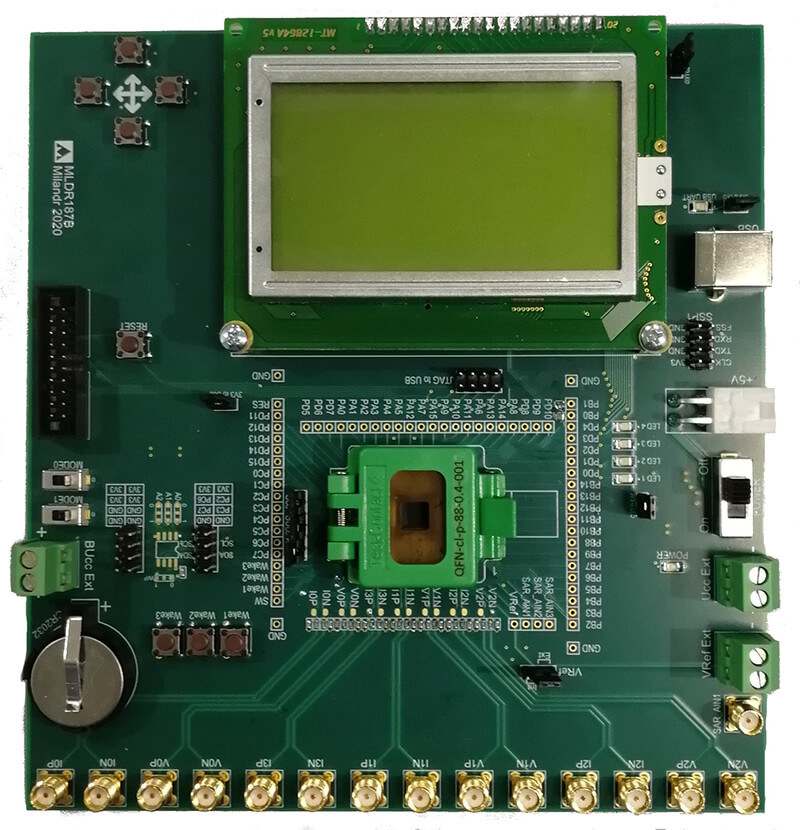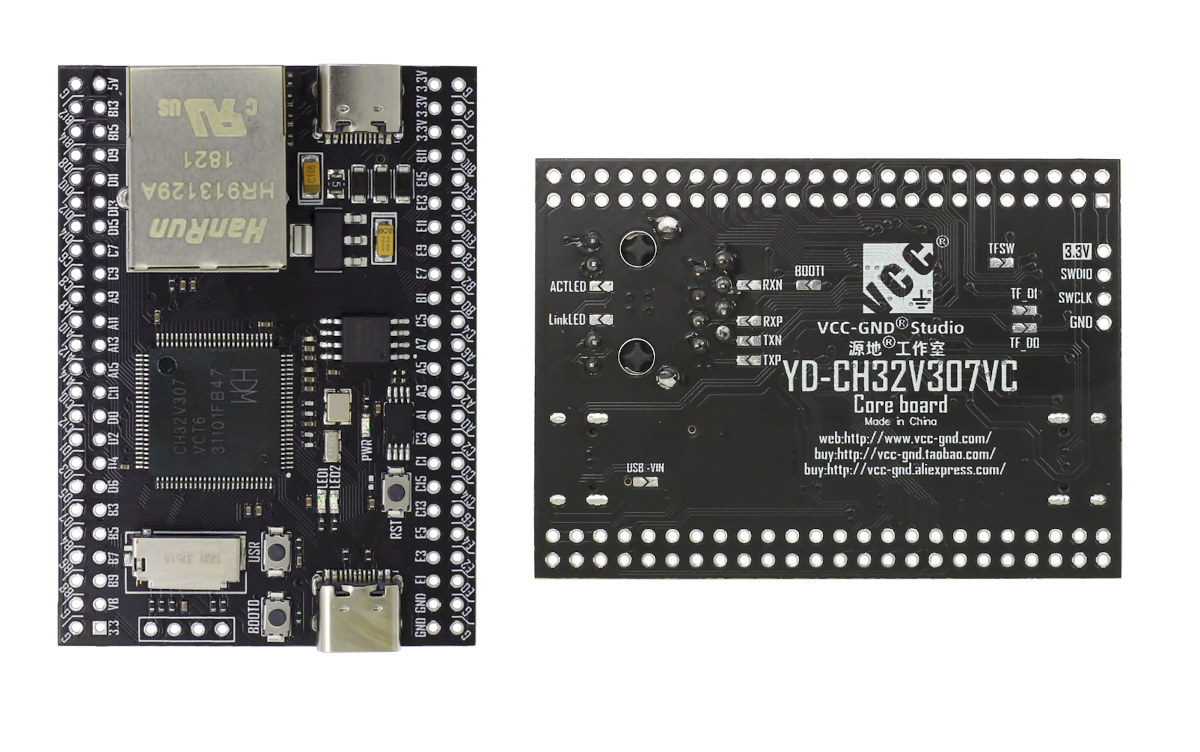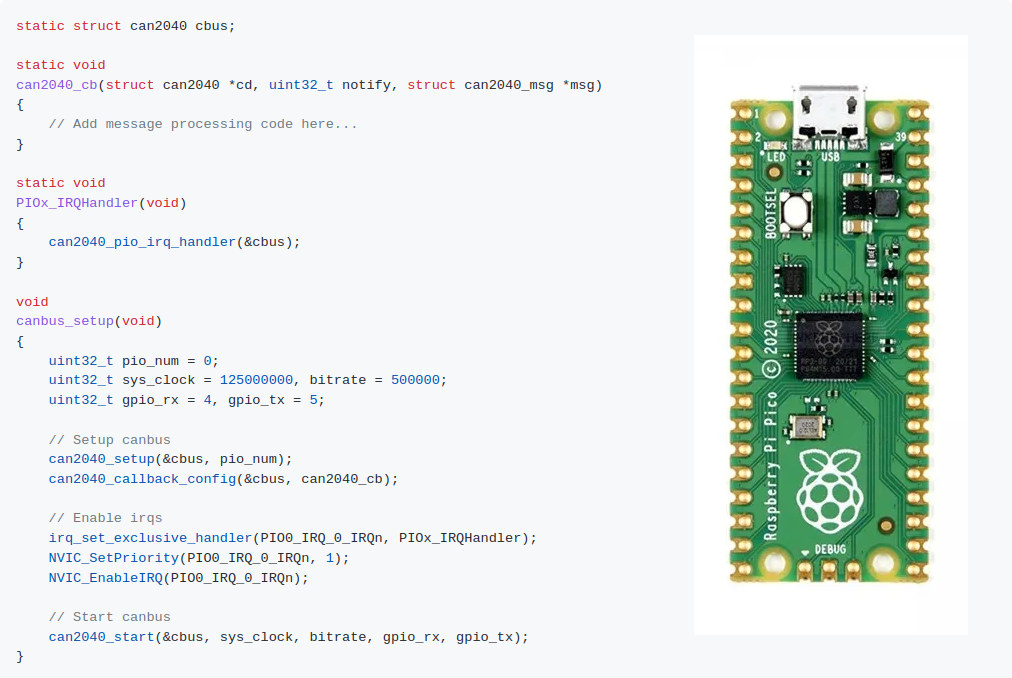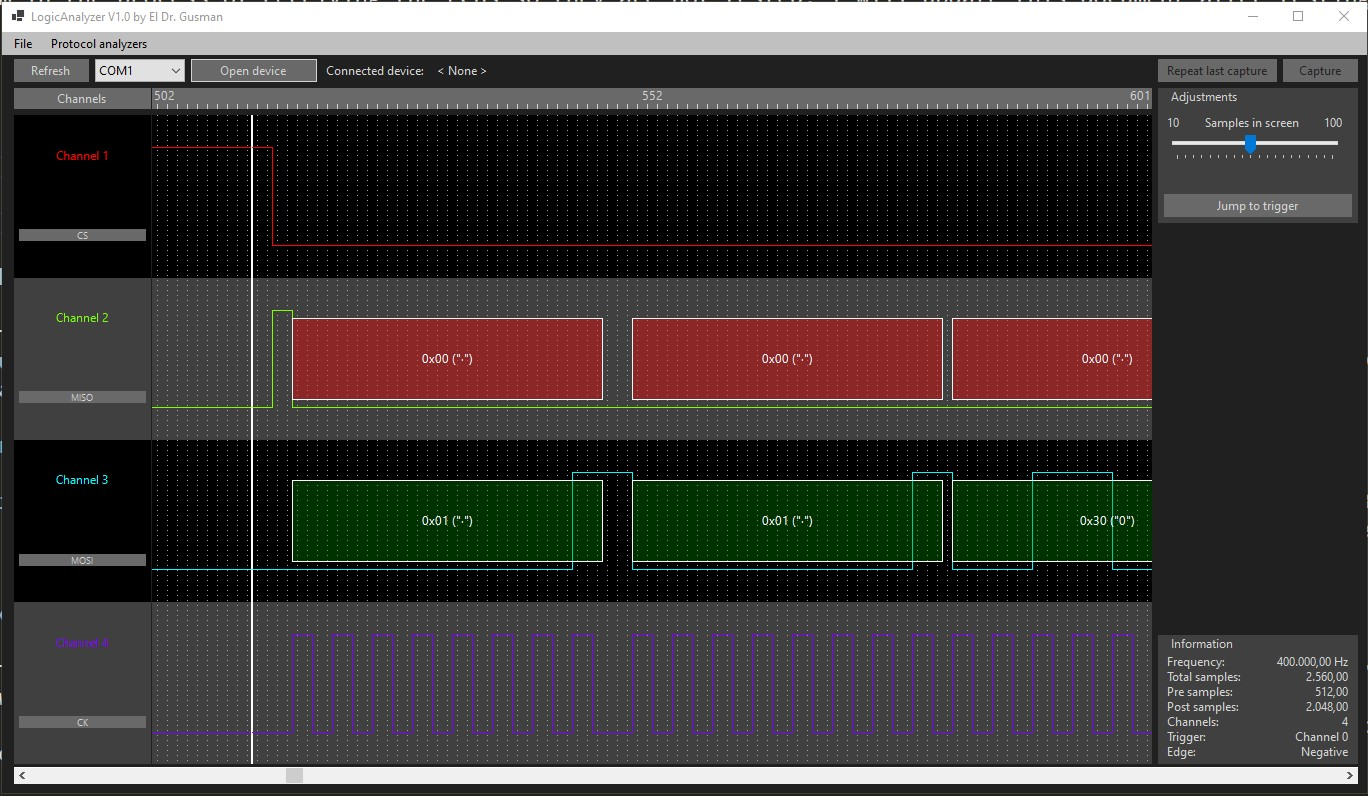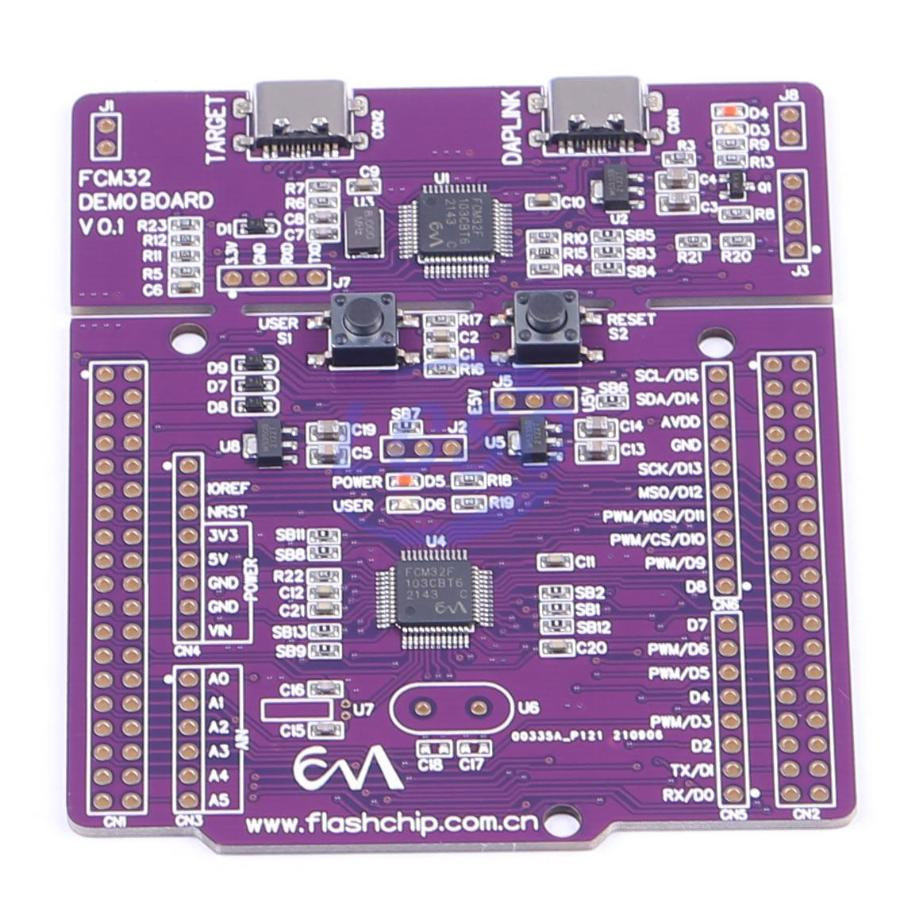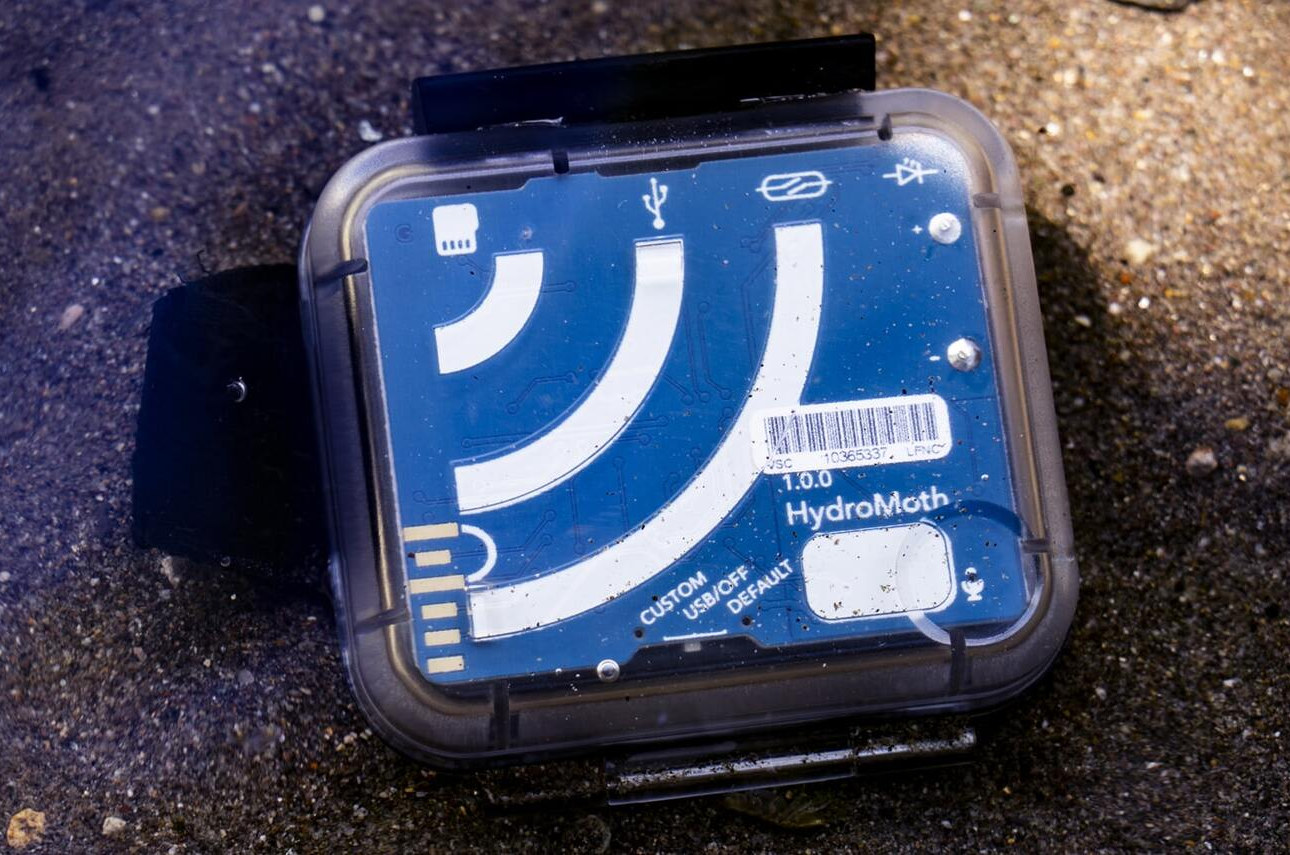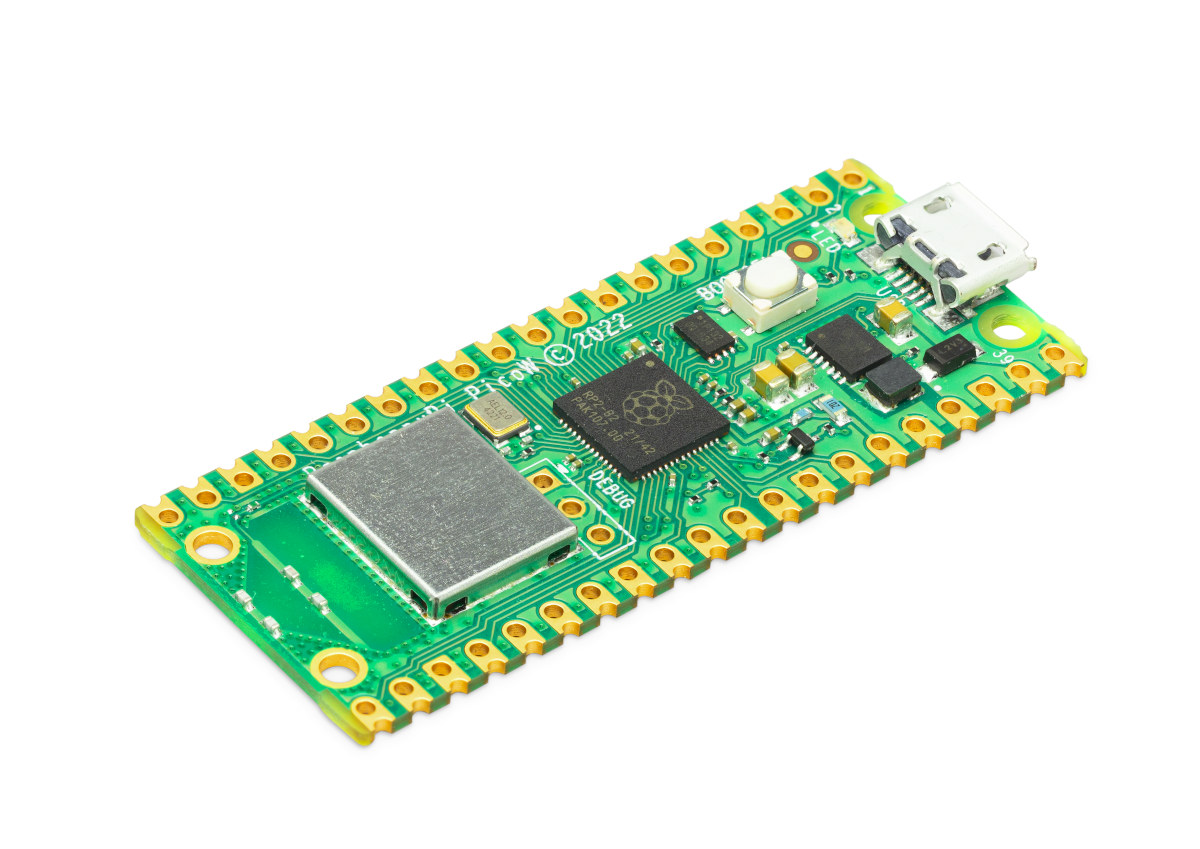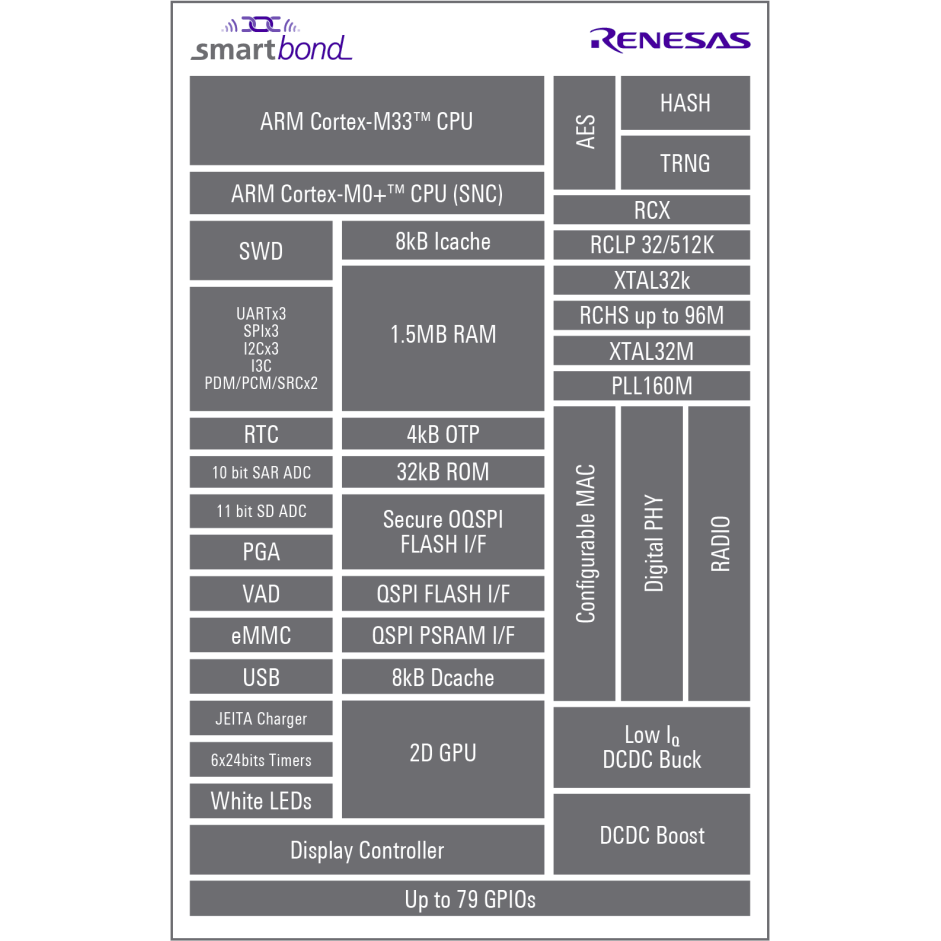Last year, we wrote about the Made-in-Russia Mikron MIK32 RISC-V microcontroller with features similar to STM32L0 Arm Cortex-M0+, and I was recently told that the first fully packed samples are expected for the end of autumn. But it turns out there’s another Russian company that makes RISC-V microcontrollers, and for instance, the Milandr MDR32F02FI features the open-source BM-310 RISC-V MCU core and is specially designed for electricity meters. It is the second generation of the microcontroller with the first being based on Arm Cortex-M0 core and produced for over 5 years. Milandr MDR32F02FI specifications: CPU – CloudBEAR BМ-310S 32-bit RISC-V core @ 60 MHz Memory – 112KB Storage – 256+8 KB flash, 16KB OTP Electricity meter function 7-channel 24-bit sigma-delta ADC Hardware unit for calculating power consumption Other Peripherals 5x UART, 3x SPI, 1x I2C Up to 55x GPIOs Instrumental ADC – 10-bit with temperature sensor 4x 32-bit timer blocks […]
YD-CH32V307VCT6 RISC-V MCU board comes with Ethernet and plenty of I/Os
At the beginning of the year, we wrote about WCH CH32V307 RISC-V microcontroller and a development board with 8 UART ports controlled over Ethernet. I’ve now been informed of a similar, but much more compact by VCC-GND Studio named “YD-CH32V307VCT6”. Besides the 144 MHz RISC-V microcontroller, the board features a 10Mbps Ethernet port, two USB Type-C ports, SPI flash, EEPROM, a microSD card socket, and four rows of 24 pins each for a total of 96 pins exposing all pins out of the LQFP100 package. YD-CH32V307VCT6 board specifications: MCU – WCH CH32V307VCT6 32-bit RISC-V microcontroller @ 144 MHz with 256K Flash, 64K SRAM Storage – 32Mbit SPI NOR flash (W25Q32), 64kbit EEPROM (24C64), MicroSD card slot Networking – 10 Mbps Ethernet USB – 1x USB 2.0 Type-C port (High Speed: 480 Mbps), 1x USB 2.0 Type-C port (Full Speed: 12 Mbps) Expansion – 2x 48-pin headers with 2 x 12-bit […]
can2040 project adds software CAN bus to Raspberry Pi RP2040 microcontroller
The can2040 project is a software CAN bus implementation for the Raspberry Pi RP2040 microcontroller that leverages programmable I/Os (PIO) to achieve reading and writing CAN 2.0B data frames at rates up to 1Mbit per second. Kevin O’Connor, the developer of the project, further explains the implementation uses only one of the two RP2040 PIO hardware blocks, so it is possible for a single Raspberry Pi RP2040 chip to have two separate CAN bus interfaces. Some processing also happens on one of the Arm Cortex-M0+ cores of the microcontroller with the processing time dependent on the amount of bus traffic, and a fully saturated CAN bus at the fastest supported rate of 1Mbit/s may use up to around 30% of that core when clocked at 125MHz, so that should still leave plenty of room for other tasks that may run on the system. I could not find any information about […]
Using Raspberry Pi Pico as a logic analyzer
MCU boards, including the $1.5 BluePill board, have been used as cheap logic analyzers for years, notably with Sigrok open-source software. So it should come as no surprise the $4 Raspberry Pi Pico board can also be used as a logic analyzer, with one developer claiming it can deliver 100 Msps, or the performance obtained with a 1.6 GHz CPU, thanks to the PIOs from the Raspberry Pi RP2040. Hackaday reported about a Sigrok driver for the Pico last March, but the topic was brought to our attention via a post on Hackster.io about an open-source Windows program developed from scratch to transform the Raspberry Pi Pico board into a logic analyzer capable of 100 Msps. Agustín Gimenez Bernad (aka gusmanb)’s LogicAnalyzer program offers up to 24 digital channels, pre, and post-trigger sampling, edge trigger and pattern trigger up to 16 bits. It can work with the Raspberry Pi Pico […]
Flashchip FCM32 is yet another alternative to STM32 microcontroller
Once upon a time, people tried to avoid STM32 fakes and clones, but in a world where companies are allegedly purchasing washing machines to extract a few unavailable components, people have started to look for alternatives, and last week I wrote about the Geehy APM32 family of STM32 clones. But I had never heard about Flashchip Microelectronics FCM32 microcontrollers, and they are not that easy to find in search engines, so they must be relatively new. The company appears to make both FCM32F clones and FCM32H derivatives with no direct equivalent STM32 part numbers, a higher clock frequency, and faster flash. For example, the FCMF030F4P6 will match the specifications of STMF030F4P6 as far as I can tell. The good news is that the datasheet is available in both Chinese and English. The FCM32H030C8T6 appears to be a higher performance version of STM32F030C8T8 / FCM32F030C8T8 with a 100 MHz frequency, and […]
Silabs EFM32-based HydroMoth enables underwater acoustic data recordings
Open Acoustic Devices’ HydroMoth is the underwater equivalent of the AudioMoth full-spectrum acoustic device that records audio samples mostly to monitor wildlife. Still based on a Silicon Labs EFM32 Wonder Gecko MCU, the HydroMoth is firmware-compatible with AudioMoth, enables audio recording at up to 60 meters deep, and has been tested to last two months at a depth of 30m using three AA batteries. HydroMoth key features and specifications: Wireless microcontroller – Silicon Labs EFM32 Wonder Gecko Cortex-M4F MCU @ 48MHz with 256kB Flash, 32kB RAM Storage – MicroSD card slot to store audio data Audio capture Onboard analog MEMS microphone acting as contact hydrophone Analog preamplifier with adjustable gain Uncompressed WAV from 8k to 384k samples per second USB – Micro USB Type-B port for configuration and reprogramming of the flash Misc Onboard RTC to track time in UTC timezone Improved 32.768 kHz MEMS oscillator to reduce clock drift […]
Raspberry Pi Pico W – A $6 Raspberry Pi Pico board with WiFi 4
I was expecting the next official Raspberry Pi board to be either an update of Raspberry Pico with WiFi and Bluetooth or with a machine learning accelerator and the new $6 Raspberry Pi Pico W delivers that wish through the addition of 2.4GHz WiFi 4. Having said that, I was actually expecting a competitor to ESP8266 or ESP32 with a new Raspberry Pi wireless microcontroller, but it did quite happen that way as the Raspberry Pi Pico W features the same Raspberry Pi RP2040 dual-core Cortex-M0+ microcontroller found in Raspberry Pi Pico board coupled with an Infineon CYW43439 chip that’s supposed to support both 2.4 GHz WiFi 4 and Bluetooth LE 5.2. Bluetooth is not enabled right now, but may be at a later stage. Raspberry Pi Pico W specifications: MCU – Raspberry Pi RP2040 dual-core Cortex-M0+ microcontroller @ 133 MHz with 264KB SRAM Storage – 2MB QSPI flash Connectivity […]
Renesas SmartBond DA1470x Bluetooth 5.2 LE SoC features a 2D GPU
I would not usually ask myself “is there a GPU?” in a Bluetooth LE SoC, but that’s exactly what Renesas SmartBond DA1470x Bluetooth 5.2 LE microcontroller offers with a 2D GPU used to accelerate the rendering of user interfaces in wearables, healthcare devices, home appliances with displays, industrial automation and security systems, as well as consoles in e-bikes and gaming equipment. The DA1470x also comes with a Cortex-M33 application core, a Cortex-M0+ sensor node controller, 1.5MB SRAM, and an ultra-low-power hardware VAD for always-on audio processing, as well as various peripherals. Specifications: CPU cores Arm Cortex-M33 core @ up to 160 MHz for the application Arm Cortex-M0+ core acting as a sensor node controller (SNC) GPU – 2D GPU for advanced graphics processing Memory – 1.5MB SRAM Storage 4 kB OTG, 32KB ROM on-chip Decrypt-on-the-fly Octa/Quad SPI flash interface Dedicated QSPI PSRAM and QSPI flash interfaces eMMC interface supporting up […]


